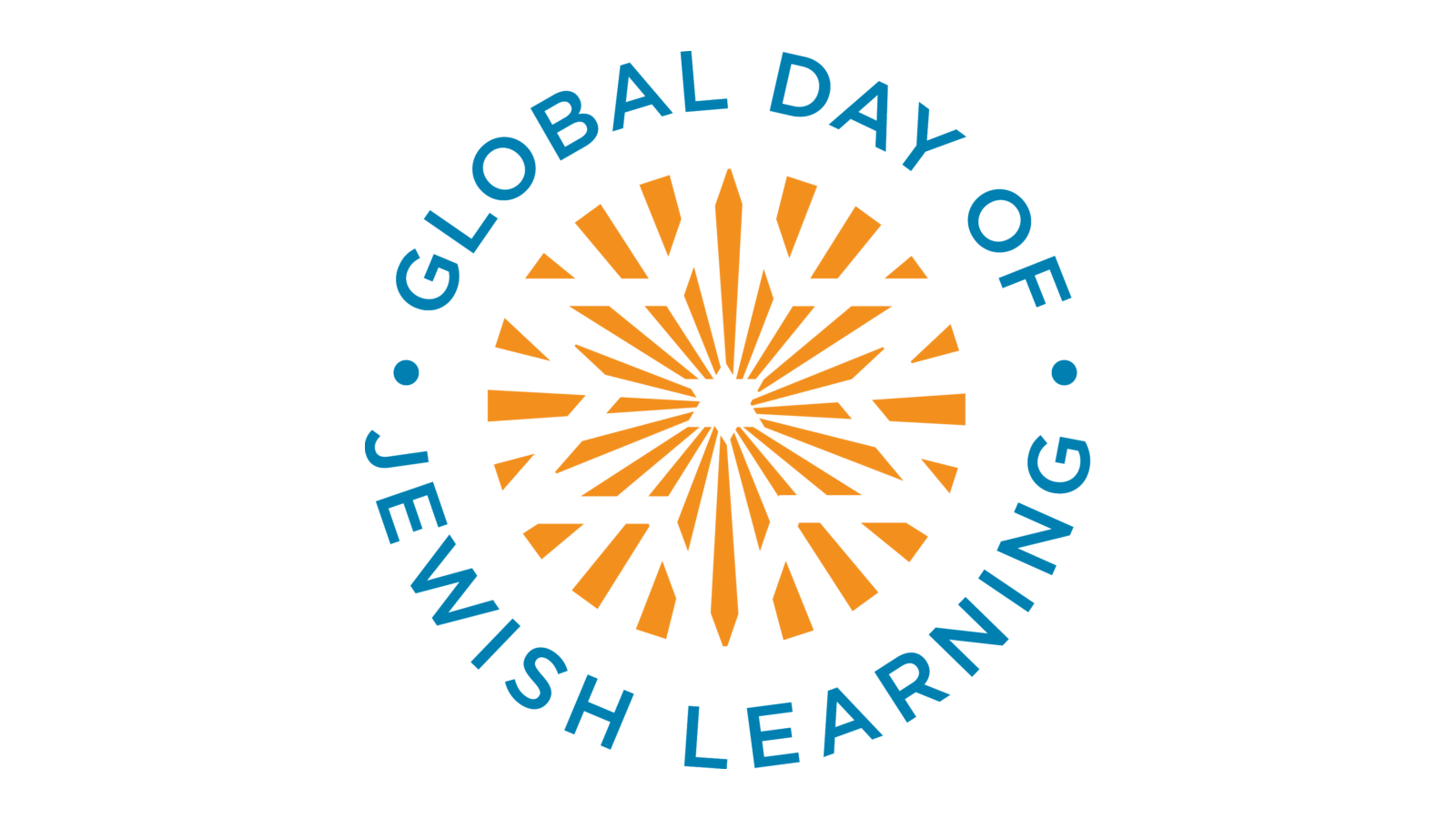Original Article Published in the Jerusalem Post
There was something for everybody as Kosherfest returns after a pandemic-induced break.
NEW YORK — Kosherfest, the trade show of the kosher food industry, returned to its longtime home at the Meadowlands Exposition Center in Secaucus, New Jersey, after being put on hold last year due to the coronavirus pandemic.
The two-day gathering, held in a large exhibition space just six miles from Manhattan’s Times Square, brings together the various important players in the kosher food industry, including food and beverage manufacturers of all sizes and numbers of years in business, store owners, caterers, restaurant owners, providers of kosher travel packages, chefs, labeling, packaging and shipping companies, food writers and bloggers and others.
Attendees all shared an interest in sampling new and classic food and beverage offerings, made potentially beneficial and profitable business connections, and accumulated as many free samples as possible — food samples, pens and tote bags.
Kosherfest 2021 offered a glimpse of what a major trade show could look like as the world slowly comes out of the restrictions of the pandemic. A food show with edibles to sample would need to adhere to a high standard of safety.
Signs at the entrance noted “Face Masks Strongly Recommended” regardless of vaccination status, and also offered “sampling guidelines,” assuring attendees that “Kosherfest exhibitors are prioritizing health and safety by following these basic food sampling guidelines,” including facemasks, gloves and tongs.
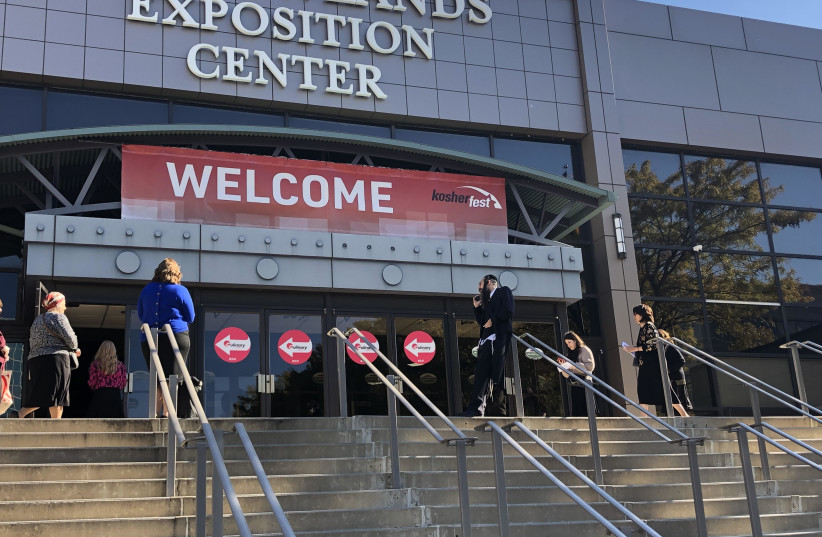
Despite the precautions set in place, the guidelines were not followed by everyone. Once attendees passed through this year’s particularly tight security, some were not wearing masks or gloves – and neither were some exhibitors. Few seemed mindful of social distancing conventions.
WHILE MORE than 300 exhibitors lined the aisles at the convention center, these numbers pale in comparison to pre-pandemic shows. “We are missing 61 companies, including more than 30 from Israel,” said organizer Menachem Lubinsky, president and CEO of LUBICOM Marketing Consulting, founding publisher of Kosher Today and a leading authority on the kosher food market.
But Lubinsky, a veteran of the kosher food industry, took an optimistic view and was not discouraged.
“There are lots of new products here and lots of business is being done,” he said. “It was important for the show to go on because the industry continues to grow at such a phenomenal pace in the US.“
We now have a whole network of independent kosher food stores and supermarkets, stores that are 20,000-50,000 square feet that used to be reserved for the national chains. Now we have independent kosher supermarkets that are doing that. Demographics are driving the growth of the kosher food industry here.”
This was Lubinsky’s 32nd year organizing Kosherfest.“When we first started the show, a place like Lakewood [NJ] had 17,000 kosher consumers; today it has 90,000. One distributor said he used to make one trip a week out there. Now, he does almost two a day. So, I feel good about the show, I feel this is going to be only the prelude to a much greater event next year – and hopefully Covid will be further on the decline, and international travel will pick up.”
Ben Aviva, CEO of Churros Original from Kiryat Malachi was one of the lucky foreign businesses to make it to Kosherfest.“
My father saw churros at a mall in Spain 15 years ago,” said Aviva, who noticed that kosher churros are not yet carried in the US. Aviva felt that interest in his fried dough product grew because of the pandemic. “People didn’t want to deep freeze at home – it is too much headache. This takes five minutes from freezer to the oven to eating.”
Sharon Feldman Vazan of the KLBD (Kosher London Beth Din) said that she had no trouble getting to the show, despite coming from Europe. She and her colleagues acted quickly once travel restrictions were lifted on November 8 for fully vaccinated European travelers. Feldman Vazan reports feeling “so thrilled” to be at the show which was “a better event than expected.”
JENNIFER KIM, Director of Business Development for the Government of Israel, currently works in New York at Israel’s Economic Mission to the US as part of the Foreign Trade Administration at the Israel Ministry of the Economy. She is tasked with promoting trade and investment between Israel and the US.
Kim had an especially important role at this year’s show, given travel issues for many Israeli companies. Lubinsky reports that the Israel pavilion traditionally houses 25 booths, but most were unable to attend. At this year’s show, Kim fielded various inquiries from people interested in doing business with Israel.
For example, three Dutch businessmen approached her seeking assistance in importing a range of Israeli kosher products for their catering company. They were appreciative and cautiously optimistic that Kim would follow through on her promise to connect them with key Israeli businesses.
As the name suggests, Kosherfest is equal parts kosher food trade show, and eating and mingling festival for anyone even remotely connected to the kosher food industry. Spending several hours at Kosherfest walking down the long aisles is both tiring and satisfying.
Brooklyn’s Flaum Appetizing offered pizza slices, humus and pita, cheese and samples of minestrone and butternut squash soup to all who stopped by their booths. Promised Land beverages occupied booth 414, right next to Fins Import, offering samples of anchovy bondarilla with olives and cold smoked anchovy fillets.
Yaakov Charlap, owner of Matzot Charlap from Bet Shemesh, was giving out samples of shmurah (guarded) matzah. For those wondering why a matzah company was reminding people about Passover when it is more than five months away, he playfully stated: “Kosherfest was canceled last year; Pessah still came – and we are the best tasting matzah in Israel!”

TZIPPORAH ROTHKOPF, who converted to Judaism in 1980 and operates Seoul House, a Korean café near her home in Jerusalem’s Old City, was giving out samples of kimchi and other kosher Korean products. A few booths away, several other Koreans were offering tastes of K-BBQ Sauce, authentic Korean BBQ sauce which “can be used in various dishes such as bulgogi, galbi or japchae.”
Latonya King, of King Preferred, offered samples of dairy and pareve cake made from her cake mixes (“my personal favorite is our 4th flavor – banana pudding pound cake”). She describes herself as the first “Black kosher certified bakery mix business in the world,” and is proud to be using an ancient family recipe.

David Guetta, a partner at California-based Mulami, was offering samples of artisanal charcuterie including salami Milano salt and pepper. He started the company five years ago using a method of fermenting and drying salami used for more than 1,000 years. “Growing up, I loved salami and couldn’t find it. I got obsessed and tried making it,” Guetta reports.
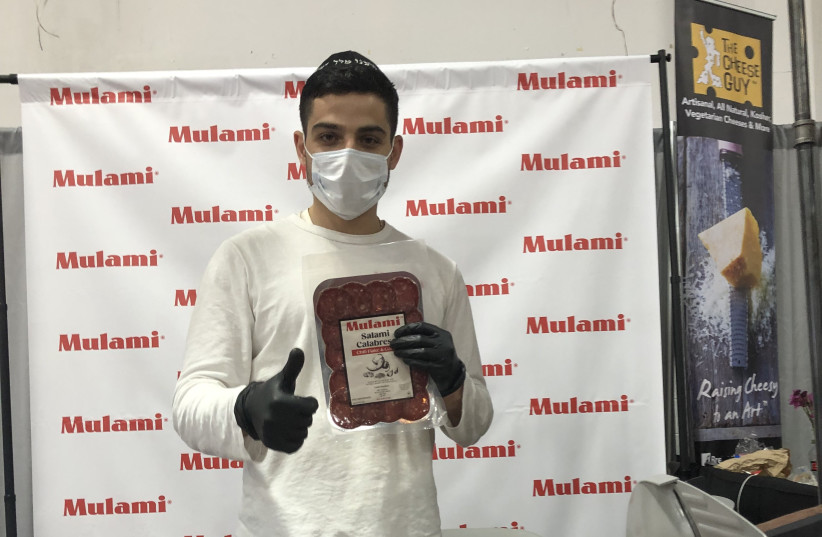
There was also wine and liqueur available for sampling. Marushika Osman of KAS Spirits in Mahopac, New York, explains why she and her husband started KAS Krupnikas, a sweet alcoholic drink distilled with local honey and a secret blend of spices. “I lost my mind!” she joked before explaining that when her husband lost his job, she encouraged him to turn his hobby of making alcohol using his Lithuanian family’s recipe into a business.
There were also non-food items on display – kitchen appliances labeling machines and companies offering business loans. Sherry Wynograd of Hillside, New York got very excited when she walked past the Shabbulb booth, displaying a special light bulb which it is permissible to adjust for brightness on Shabbat. “It is the greatest thing ever. I got it for all of my kids!”


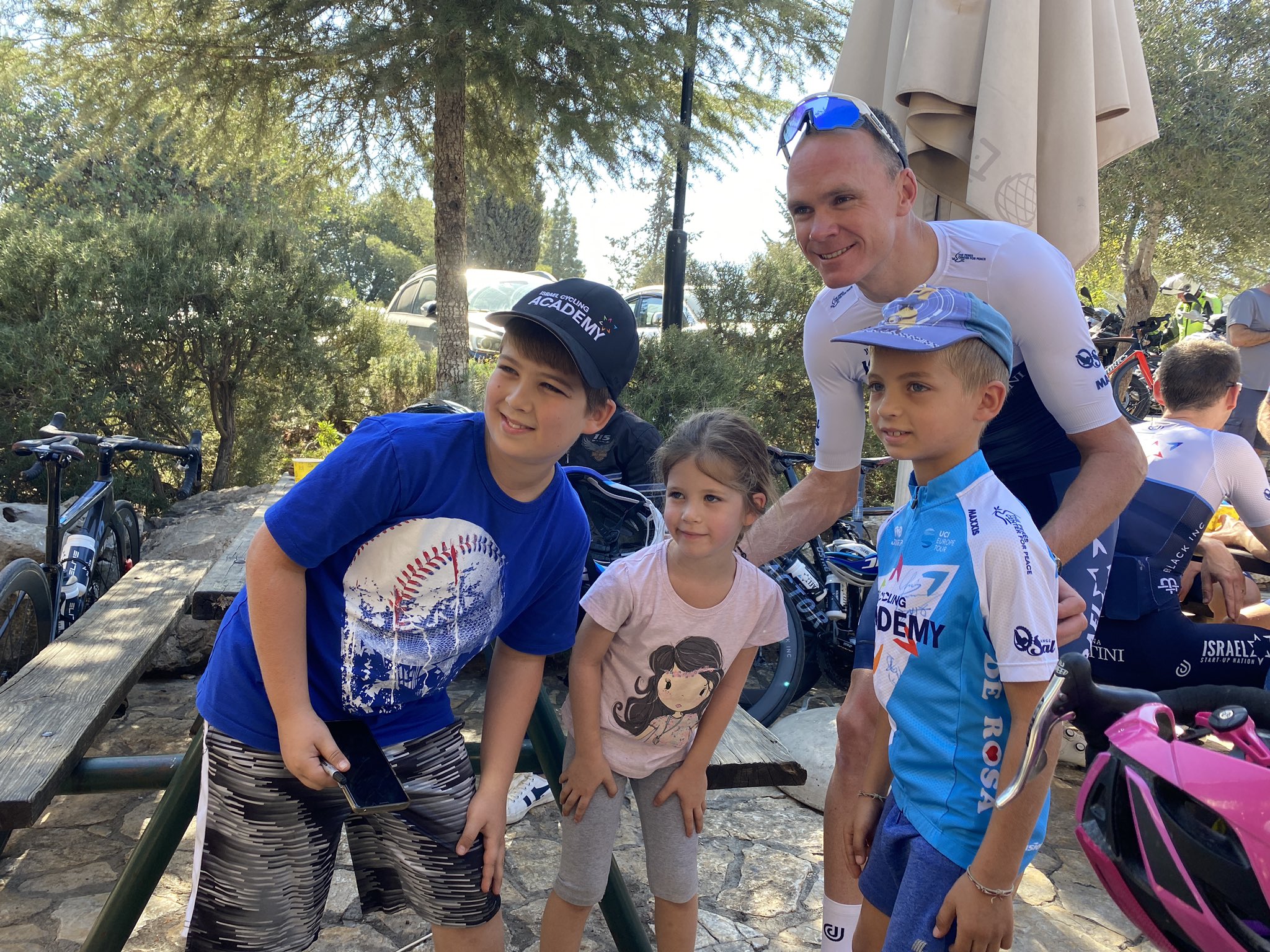 Four-time Tour de France winner Chris Froom greets some of his younger fans during a stop outside of Jerusalem by members of Team Israel Start-Up Nation. Source: Twitter.
Four-time Tour de France winner Chris Froom greets some of his younger fans during a stop outside of Jerusalem by members of Team Israel Start-Up Nation. Source: Twitter.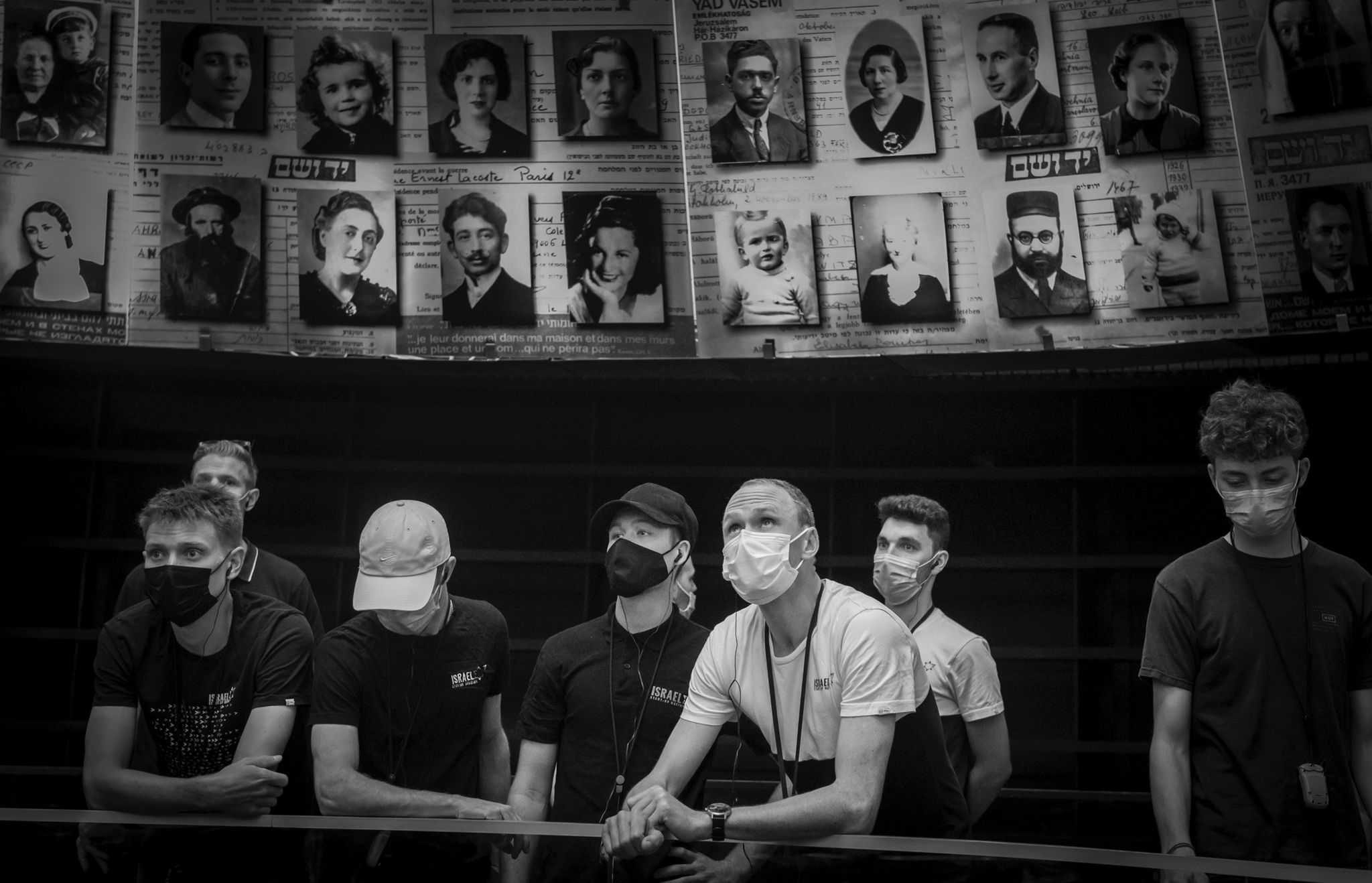 Cyclists with Team Start-Up Nation Israel tour Yad Vashem in Jerusalem. Credit: Noa Arnon/Cycling Academy LTD.
Cyclists with Team Start-Up Nation Israel tour Yad Vashem in Jerusalem. Credit: Noa Arnon/Cycling Academy LTD.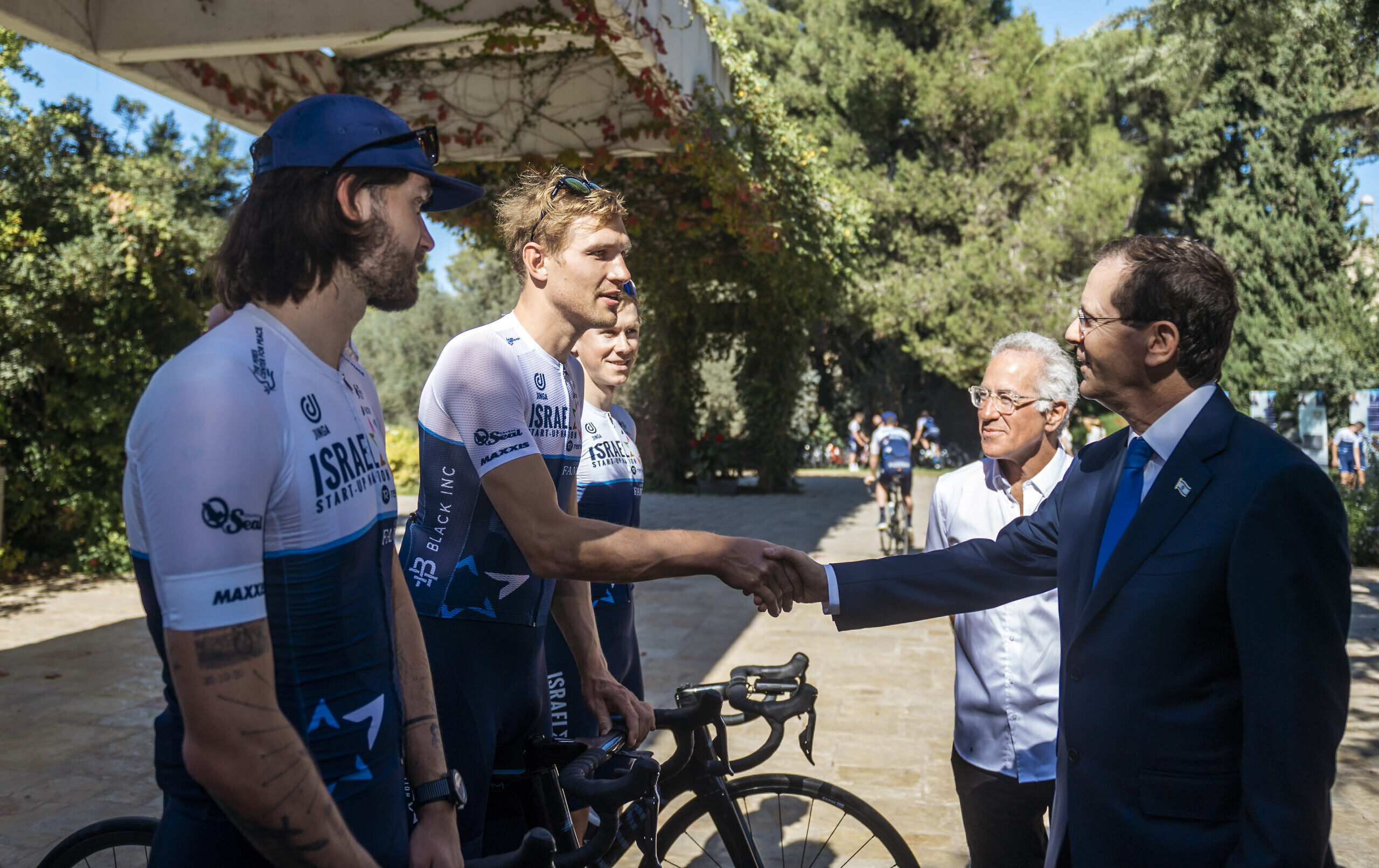 Cyclists with Team Start-Up Israel meet Israeli President Isaac Herzog. Credit: Noa Arnon/Cycling Academy LTD.
Cyclists with Team Start-Up Israel meet Israeli President Isaac Herzog. Credit: Noa Arnon/Cycling Academy LTD.


